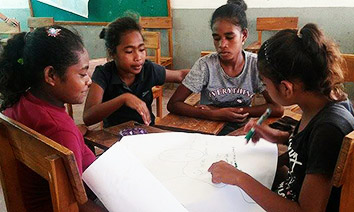Students, schools and the struggle against violence in Timor-Leste
Date:



“Only women should cook” and “A woman must do what a man tells her” according to 100 percent of girls and boys aged between 10 and 14 years from a survey conducted in a primary school in Suai, in the southern district of Covalima. While 100 percent of girls and 0 percent of boys agreed with the statement that “Men should help look after the children”.
The questions posed by UN Women staff to the 17 students – and in focus group discussions with 13 teachers – on women and men’s childcare and household responsibilities are the first step in the development of a community-led initiative working with primary schools in the districts of Covalima, Dili and Oe-cusse, to prevent gender-based violence. The programme – with the support of the European Union (EU) – aims to build on the interest expressed by teachers, parents and other community members during an assessment in 2014 on the potential of working with schools to combat gender norms that result in violence.
The views of teachers and students reflected deeply ingrained gender stereotypes, and an inconsistent approach to dealing with matters of violence. Concerns were raised over effective methods of teaching and dealing with difficult students: “There is not one teacher that does not use violence to solve problems,” proclaimed one teacher. Teachers voiced diverse views on what constitutes violence, its acceptability, and how it should be dealt with. Moreover, they were unaware of alternative disciplinary methods, the importance of ending violence, and the district-level referral networks and services available for students who need support.

As the Ministry of Education prepares to roll out its revised basic education curriculum in 2015 – including greater attention to promoting gender equality – UN Women will deepen its engagement with communities in Covalima, Dili and Oe-cusse, supporting the students’ wishes to end all forms of violence in their community. “The new curriculum will encourage more group work, and we feel positive about this,” reflected one teacher. “This way, the students can learn from their peers, and the students and teachers can teach each other harmoniously.”